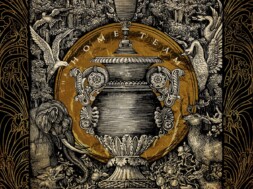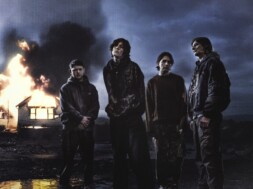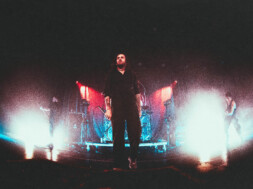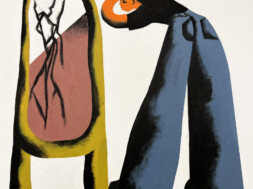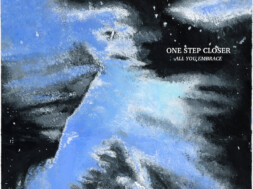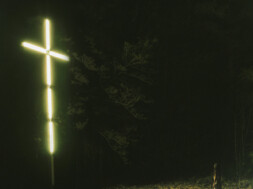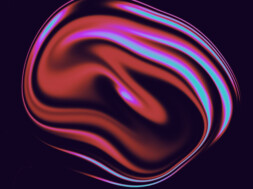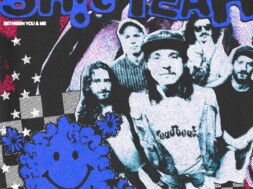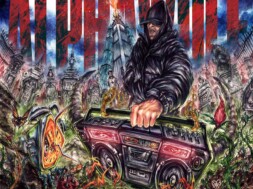
Deftones are my favourite band. Over the course of their 20-plus year career they have built up a stunning catalogue of music that repeatedly demonstrates relentless creativity as well as exceptional individual and collective talent. The quintet has proven brilliant at everything they care to turn their hands to: helping to kick-start a genre in the form of nu metal; destroying and then rewriting its rulebook at the turn of the millennium; then evolving lightyears beyond it to hitherto unexplored realms of post-metal. Consistent to a fault, each one of Deftones’ albums is fantastic, and they are one of very few bands to have crafted two stone-cold classic LPs a decade removed from one another in 2000’s White Pony and 2010’s Diamond Eyes. As such, each new Deftones release is a wholly unpredictable proposition and an event to get excited about, particularly considering how long they often take between albums. Slow and steady really does win the race.
Gore is their latest opus. Pitched somewhere between their self-titled album’s anxious dread and the haunting shoegaze of Saturday Night Wrist, it exhibits a far more agitated Deftones than we’ve seen for quite some time. The decision to put out opener “Prayers/Triangles” and the heavier “Doomed User” as the pre-release tracks has proven an interesting one as they hinge on a big, memorable chorus and meaty central riffs respectively, neither of which are common features of the album as a whole. Deftones’ brilliance has always hinged on the axis between Stephen Carpenter’s skull-puncturing guitar work, which drives their more ‘metal’ material, and the luscious melody provided by the vocals (and more and more frequently, additional guitars) of Chino Moreno. Gore tilts firmly towards the latter, largely eschewing obvious hooks and any real grooves in favour of purple-pink atmosphere, fragile textures and songs that spiral into the stratosphere with little care for conventional structure.
This is unmistakeably a Deftones record, despite taking more risks than they have for a good while. It’s more diverse than its two predecessors but far less willing to make its brilliance obvious to the listener. Rather than going for a direct punch, the molten power of “Acid Hologram” unfolds slowly over four minutes, even finding time to recall the lascivious side of Around the Fur in sections of grinding guitar, gurgled vocal and twinkling electronic effects. “Pittura Infurmante”, meanwhile, is as wilfully unorthodox as its title suggests. Chino avoids an obvious approach and instead toys with the ever-contorting musical backing, refusing to to deliver the chorus that would bring it all together. Gore is difficult to initially get to grips with, both because of how broad the scope of the material is and how obtuse the routes that its songs take can be.
The most immediately striking parts are those that wholly embrace the overall shift that the album makes towards the serene and vulnerable. “Hearts/Wires” is stunning, building from an exquisite space rock introduction to a wholly complete piece of music that helps to temper the unpredictability of elsewhere. Similarly beautiful is the much-anticipated Jerry Cantrell (of Alice in Chains fame) collaboration on “Phantom Bride”. Lead guitar in as traditional a sense as he brings to the table is a new addition to the Deftones canon, and Cantrell’s performance perfectly augments the euphoria of the track as a whole before a dense, shuffling conclusion brings it back in line with the rest of the album.
It’s one of the more optimistic and straightforward songs on Gore, alongside the comparatively Koi No Yokan-esque “Geometric Headdress” and “Xenon” (though the latter features a skewed guitar riff that almost throws the whole thing off). Elsewhere, Deftones are in darker waters than any time since late bassist Chi Cheng’s accident – that this is the first album produced since he tragically passed away looms in the background of proceedings. When “(L)MIRL” emerges out of waterlogged clean guitar plucked from classic track “Digital Bath” into a bass-driven hypnotic crawl that’s closer to Tool than archetypal Deftones, the effect is spine chilling. Both the song and the album as a whole pull themselves out of darkness into a cool air of sanguine defiance, but there’s no escaping how nervous and tense Gore feels at times.
Most of this is achieved through nervous ambience rather than the vicious riffs of old, but “Doomed User” is not the sole moment in which Carpenter’s concrete tone (which on that track even tips a nod to Judas Priest trad-metal) rips through the soundscape. Backed up by chugging bass from Sergio Vega and some wonderfully visceral, quintessentially Deftones lyrics (“our bodies are wet, there’s blood on the beaches”) he makes his presence firmly felt on the title track. In its closing moments the impenetrable dirge of eight-string heaviness is punctuated by a guttural scream: it’s as heavy as anything the band has put their name to.
As a unit perfect for the descriptor “more than the sum of their parts”, it’s far easier to heap hyperbole on Deftones as a whole than each of the musicians, but there are as ever particular points of commendation. Abe Cunningham remains a solid contender for the best drummer in popular music today, anchoring a meandering body of work perfectly. The contributions from keyboardist/samples wizard Frank Delgado are initially harder to find on Gore than is typical, but listen clearly and he is discernibly elevating the moments of intensity before coming more to the fore in the ambient strokes. Vega proves for certain that he’s as a good a foil for Carpenter as the man whose shoes he has had to fill, while there is little to say about the brilliance of Chino Moreno as a vocalist that has not already been said. His lyrics are as evocative and visual as any of his contemporaries, and he remains the master of flitting between banshee shrieks and velvet soft melody. Final track “Rubicon” is perfect testament to the latter, boasting one of the few memorable choruses of Gore before an instrumental denouement cuts away just as it really kicks into groove.
It’s an effective metaphor for the album as a whole. This is not the dreamlike rejuvenation of Diamond Eyes and Koi No Yokan, and as much as it takes from the self-titled and Saturday Night Wrist, this record is its own animal. It’s not flawless: by design it lacks the cohesion and consistency of the best Deftones albums, and its less adventurous moments (those closest to their recent material) suffer in comparison to the new ground that surrounds them. Its brilliance is far from immediately apparent, and repeat listening is required to really get to grips with its charms. Volatile post-rock experimentalism nonetheless suits Deftones, particularly in a stage of their career where fragility is likely easier to conjure than brute force. Gore is only predictable in that it is excellent. It is yet another reason why I am proud to call Deftones my favourite band.

